‘They’ll Be Olympians’: Hockey Star Pritam Siwach Gives Haryana Women a Bright Future
Pritam Rani Siwach, former captain of the Indian women’s hockey team, started an academy for underprivileged girls in Sonepat, Haryana. Her academy has produced Olympians like Neha Goyal, Nisha Warsi and Sharmila Devi, and given hundreds of others an education and a secure livelihood.
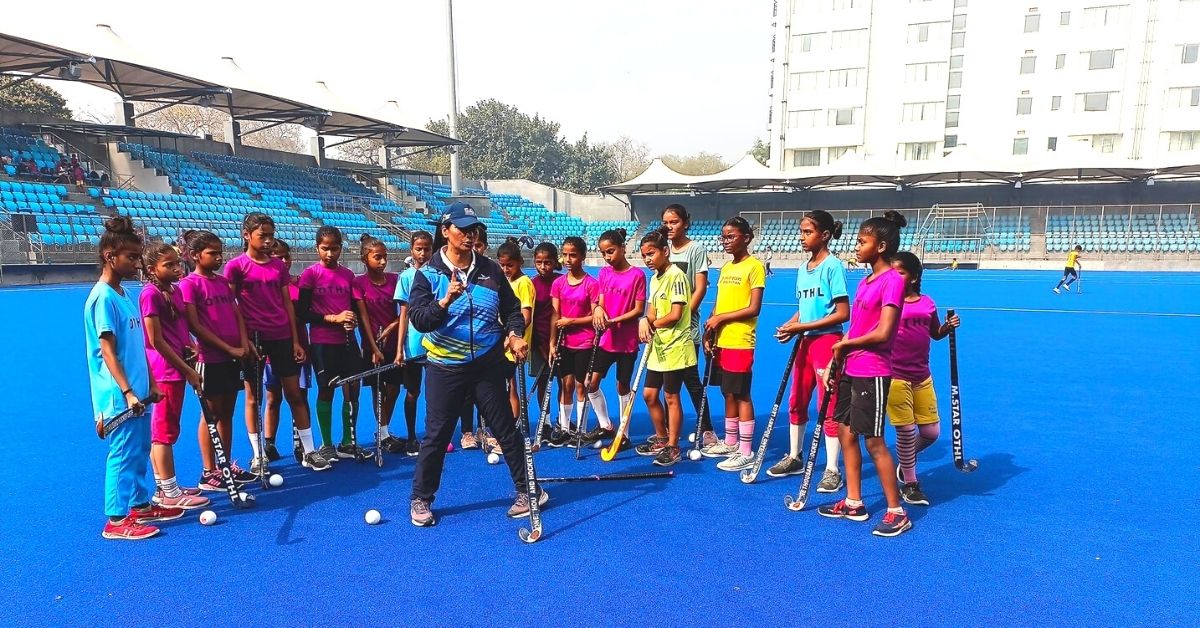
This article is part of #MakingSportWork, a series launched by The Better India and Sports and Society Accelerator. The series celebrates India’s independence with stories of heroes who have spent years working to improve lives around them through sports. Stay tuned for inspiring tales of those who are #MakingSportWork.
Pritam Rani Siwach has spent a lifetime breaking down barriers. As an athlete with the Indian women’s hockey team, she shattered the notion that Indian women can’t compete at the highest level of sport after giving birth. The dynamic centre forward famously shed 18 kg in just three-four months to not only get selected for the 2002 Manchester Commonwealth Games (CWG) but also score a goal in the process and help the team secure gold.
In the 20 years following, she became captain of the national team, began her stellar journey in coaching, retired from the sport, came back, retired again and trained a new generation of stars lighting up the women’s game in her own academy. Located in Sonepat, Haryana, the Pritam Siwach Hockey Academy primarily trains girls from economically disadvantaged families.
While some of the 47-year-old’s wards have represented India at the senior level like Neha Goyal, Nisha Warsi and Sharmila Devi at the 2020 Olympics, others have earned a decent education and secure livelihoods.
Her interventions, however, aren’t limited to improving the lives of these athletes but also changing society’s perceptions of what young girls can do.
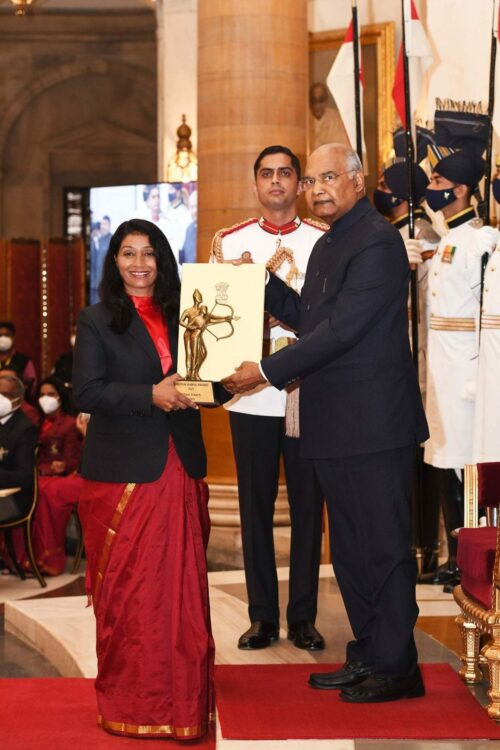
Giving girls a chance
From a small village near Gurugram, Pritam remembers what it was like trying to play hockey as a young girl, the taunts she suffered, and also the support she had from her family.
“Growing up, I would hear questions like ‘what will this girl do by playing hockey’, ‘kaunsa tir marna hai hockey khelke’ and ‘girls like her should stay at home and learn how to cook’, etc. My father, a government employee, and brother, a wrestler who represented India at the CWG, supported my dreams of playing hockey. However, I still had to fight to play, and support from my family didn’t stop the relentless taunts,” she says, in a conversation with The Better India.
It was this memory, among others, which motivated Pritam to get into coaching. Inspiration to get into coaching came from her physical training instructor (PTI) Master Tara Chand.
“Master Tara Chand-Ji was not even a ‘proper’ hockey coach, but his hard work and dedication helped me become an Arjuna Awardee and a medalist (silver medal in the 1998 Asian Games and silver medal in the 1999 Asia Cup, besides the CWG gold) for India. As a coach, I wanted to help other girls who had a passion for hockey and ensure that they didn’t suffer the same restrictions and problems that I did,” recalls Pritam.
Following marriage to her husband Kuldeep Siwach, a former hockey player, she shifted base to Sonepat. That’s where she would make her mark.
“Although it was a backward area, it had a good boy’s hockey team. My husband, Kuldeep, grew up playing here. I also saw that girls from Sonepat and its neighbouring villages really wanted to play hockey but received no attention. So, why not let these girls play? Kuldeep warned me initially that trying to get girls in the area to play will create an unnecessary stir, and a lot of difficulties and ignored my idea initially. Despite this, I was determined to do something for these girls,” she says.
Finding her ground
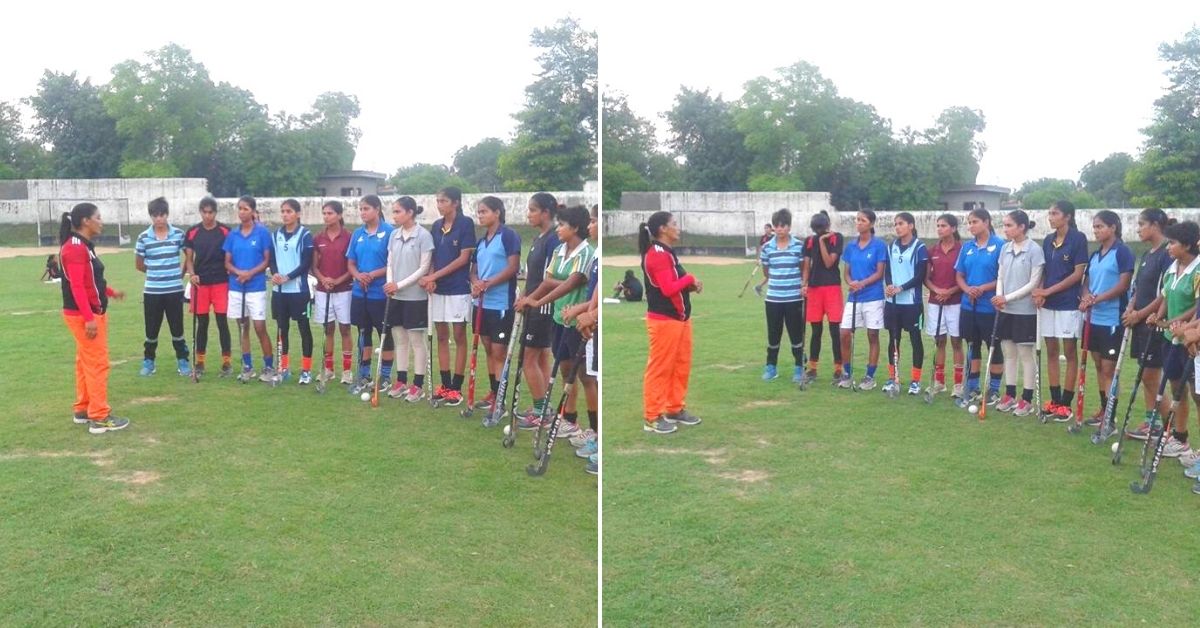
While she began coaching back in 2002 after the Manchester CWG, it wasn’t anything like the academy we see today. She taught hockey in her own capacity while training back home in Sonepat or during extended breaks following camps with the national side.
It was during a drive to the local market in 2004 when Kuldeep and Pritam found the parcel of unkempt land where their academy stands today. “It wasn’t even a proper ground with the local livestock eating away all the grass. My husband told me to leave it, don’t get into this mess and get him into trouble. But I was determined that girls from my academy will play here. The ground was in a terrible state. It was more like an unkempt public park in an industrial area,” she recalls.
Going ahead with her plans, she put out an advertisement in a local newspaper asking young girls from Sonepat and its neighbouring villages to learn hockey for free at this ground.
“The following day a couple of children came to play. They had no equipment. I shared whatever stock of old and new hockey equipment I had and started training them. On the first day, about 15 to 16 girls came. While my husband was initially dismissive, he later offered his full support. He understood the resistance I was going to face for my efforts to teach hockey,” she explains.
Over the next 18 years, Pritam would have to overcome many steep challenges. It started with trying to convince these underprivileged families to send their girls for hockey training.
“These were very poor families. The local area wasn’t very welcoming of girls coming to play. People had problems with young girls wearing shorts to play hockey. I began visiting these families, especially in the neighbouring villages and tried to convince them to send their girls for hockey coaching. I gave them my example of how my in-laws supported me while I played for India in the Commonwealth Games even after getting married and having a child,” she recalls.
But convincing their parents wasn’t easy. She recalls trying to positively motivate these families by promising them to get their children admission into schools, giving them healthy diets, buying them uniforms and shoes and giving them exposure by taking them outside the city to play matches. She also showed them a vision of these girls playing for India someday and getting job opportunities. It was a real struggle because there was little support for it publicly.
Besides learning hockey, she wanted to ensure that these girls also focussed on their academics. And even when their parents had no money to pay fees, in the early years, she took care of it after convincing school management to lessen them. She bought composite field hockey sticks and balls from her sponsors at half price or a big discount. Pritam, Kuldeep and his friends would also sometimes pool in their resources to buy equipment, bananas, milk, etc.
Often she would dip into her salary and savings.
One interesting method she adopted to raise funds was to participate in these open local tournaments in Haryana where the winners would win cash awards. Her teams would win these tournaments, pick up the cash award and spend it on buying drinking water, goal posts, nets, etc. Assistance also came from individual civil servants, who were impressed by the work she was doing for these girls. In 2009-10, Ajit Kumar Balaji, who was then the deputy commissioner (DC), helped build proper toilets for these girls.
“Even today, I take care of the expenses for the girls who train there today whether it’s their training or diet. There is no support from the government,” she says.
The ground itself has a tale to tell. When the girls began training there, they would sometimes encounter local wrestlers who would come there to practice. Pritam recalls pleading with these wrestlers to take their practice sessions elsewhere because the girls had nowhere else to play.
“In fact, it was the girls from the academy, who grew grass on the ground and helped regenerate it. Sometime in 2006, I recall the then DC Neerja Shekhar, putting up a signboard in front of the ground which said, ‘Mahila Hockey Ground’ (women’s hockey ground). Despite the administration’s seal of approval, people would still come into the ground for their daily walks. Things eventually began to change when the public recognised that young girls play hockey here, practice regularly, maintain the ground and even water it,” she recalls.
The tide began to turn for Pritam Siwach’s academy once two of her athletes got jobs with the Indian Railways. “What you see today took years of blood, sweat and tears, and my biggest supporter in this endeavour has been my husband. My family supported me and this meant a lot in an area where women weren’t allowed to work or play,” she says.
Pride and hope
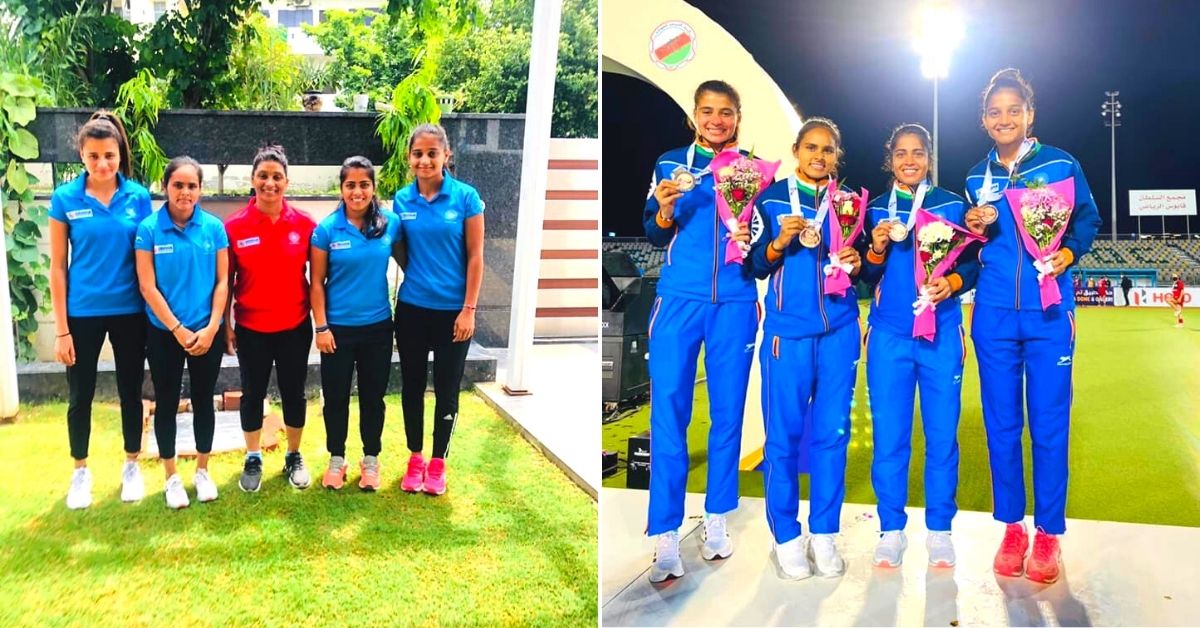
Players like Neha Goyal, Nisha Warsi and Sharmila from her academy have gone on to play for India in the Olympics. Neha, for example, has played for the senior team more than 100 times. An attacking centre-half, she is an integral member of the squad that will participate at the FIH Women’s Hockey World Cup 2022. Her story is emblematic of the kind of impact Pritam had.
It was more than 15 years ago when Neha took her first steps in the game. She had only joined Pritam’s academy because a friend had told her that girls get nice clothes and good shoes to wear. Growing up, Neha’s mother supported a family which included her sisters and an alcoholic father on a measly income of Rs 2,000 a month. It was Pritam who showed her a vision of playing for India in the Olympics and using hockey as a means of making her family’s life better.
“Growing up, she [Pritam Siwach] supported us a lot. Coming from a poor family, I had very little. She not only bought me shoes and clothes but also paid my school fees. She always believed in my talent and said I could one day become the best player in the world and represent India,” says Neha.
She adds, “I learned so much from her. My goal was to be like her — win the Arjuna Award and win medals for the country. Even when I was out of the Indian team due to an injury, she motivated me. She told me never to give up. And in 2017, I made my comeback and haven’t looked back since.”
Pritam says, “When I played for India, we could never qualify for the Olympics. But I promised my husband that I’ll coach, train and prepare my girls to become Olympians. Seeing those three play in the Olympics made me feel like an Olympian.”
What about girls who don’t end up playing for India? One thing Pritam emphasises in her academy is the importance of formal education. Her message to these girls has always been to study hard and only play the game with passion. If you’re good enough, you’ll play for India.
About five years ago, Ashish Arya, the former chairman of Little Angels School in Sonepat, where parents from wealthy families send their kids, enrolled 18 girls from the academy in Classes 6 and 7 and gave them free education. Pritam’s academy girls have won tournaments for the school. Now they’re in high school, but more girls from the academy continue to enrol.
“Girls who don’t make it in hockey have found careers in SSB, income tax department, Indian Oil and Railways. About 40 girls from my academy have so far got regular jobs. Some are school teachers, while a few have become coaches. If they can’t get anything, I try to find them jobs as coaches in private schools where they can at least earn a steady income,” she claims.
For girls, and now little boys too
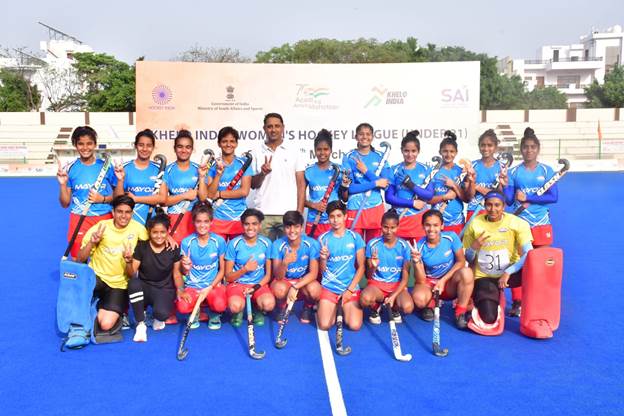
Whenever a girl from the academy gets a job, the first salary is deposited into the ground. They have opened a bank account, which is run by the girls at the academy. They maintain a diary of expenses as well. “Any of our girls who play for India donate free hockey sticks. On this ground, girls play and run it too without any support from the government,” she says.
Today, there are about 170-180 girls who come and play at the academy with some as young as 8 and 9. And now there are 20 boys as well. They’ve started training boys this year itself. These are the brothers of the girls who would earlier practise on the ground. These boys are also from very poor families. In total, 200 children come to practice and play at this ground every day.
But there are still some things Pritam Siwach needs for her academy like an astroturf. She’s been trying to get one for years and has written to the authorities multiple times with little luck.
Having said that, she’s proud of how far the academy has come, and the impact it has made. In March 2022, the Pritam Siwach Hockey Academy, Sonepat, emerged winners of the Khelo India Women’s Hockey League (U-21) and took home a cash prize of Rs 10 lakh. Last year, the President of India awarded her the prestigious Dronacharya Award.
“If nothing else, I wanted to bring change to this society. I’m glad to say things have changed so much that every weekend, there are league matches which, believe it or not, parents organise. More importantly, people’s attitudes have begun to change,” says Pritam.
(Edited by Yoshita Rao)
Like this story? Or have something to share? Write to us: [email protected], or connect with us on Facebook and Twitter.
If you found our stories insightful, informative, or even just enjoyable, we invite you to consider making a voluntary payment to support the work we do at The Better India. Your contribution helps us continue producing quality content that educates, inspires, and drives positive change.
Choose one of the payment options below for your contribution-
By paying for the stories you value, you directly contribute to sustaining our efforts focused on making a difference in the world. Together, let’s ensure that impactful stories continue to be told and shared, enriching lives and communities alike.
Thank you for your support. Here are some frequently asked questions you might find helpful to know why you are contributing?


This story made me
-
97
-
121
-
89
-
167











